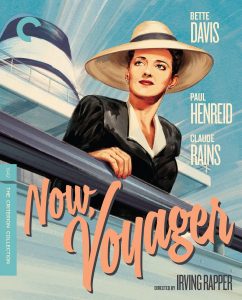Read also:
How to Watch FX Live Without CableHow To Watch AMC Without CableHow to Watch ABC Without CableHow to Watch Paramount Network Without CableWelcome to the Criterion Corner, where we break down some of the month’s new releases from the Criterion Collection.

#1004: Now, Voyager (1942), dir. Irving Rapper

When Bette Davis first climbs down the ramp of the cruise ship about a half-hour into Irving Rapper‘s 1942 film Now, Voyager, it’s hard to take your eyes off her. Decked out in beautiful white heels, a dark, sleek dress, and the first of many gravity-defying wide-brimmed hats she would wear over the course of its two-hour runtime, Davis’ first presentation of the transformed Charlotte Vale is deliberately eye-popping. It’s the look fo someone who’s finally made it, or at least needs to dress the part.
We know better, of course; until this point, Charlotte Vale has been a wallflower, a middle-aged spinster doomed to singlehood and misery at the behest of her rich, controlling mother (Gladys Cooper, who like Davis, was nominated for an Academy Award for this film). A warm, supportive psychiatrist (a paternal Claude Rains) has given her a new chance at life – one far from the reins of her mother. But will she be able to fully accept that she’s earned more than life than mockery, scorn and belittlement?
Watching it from a 2019 perspective, it’s wild how shockingly progressive — and watchable — Now, Voyager remains nearly 70 years later. As a ’40s melodrama, it sings with performances both broad and subtle; contrast Davis’ despairing cries with, for instance, Paul Henreid‘s calm, collected pathos as an unhappily married man who forges a close connection with Charlotte over a fateful cruise to South America. But Rapper’s film never fails to center Charlotte in her wants and needs, and even her desire to be with a man comes secondary, eventually, to her desire to be self-actualized.
Davis was one of our great movie stars, especially in her prime, and it’s staggering to watch her work here; she’s firm and fearful in equal measure, able to play the spinster and socialite with incredible alacrity. There’s a warmth to her, especially in her late-film interactions with young Tina (a spirited Janis Wilson), but behind it always the glimmer of becoming as cold-hearted and shut-off as her mother. For all the theatricality of the film’s bigger moments, there’s an unpretentiousness with which she conveys many of Charlotte’s varying modes — cagey, loving, self-loathing and proud.
The film’s emphasis on psychoanalysis as an unironic good also hews closely to the relative novelty of the practice in the ’30s and ’40s, as well as its increasing popularization and destigmatization. Dr. Jaquith’s Cascade sanitarium isn’t treated with dim lighting and padded rooms, but as a lovely cottage in the woods set to sweeping strings from Max Steiner‘s Oscar-winning score. Much like Charlotte’s rejection of traditional norms for women’s place in the world, knowledge of the self (and the power of self-care) becomes a major lesson for the film’s intricate, romantic script. All in all, Now, Voyager goes down as one of the greatest triumphs of the ’40s studio system, especially in the comparatively-devalued genre of the “women’s picture.”
Luckily, Criterion recognizes that too, and their Blu-ray is a wonder to behold. It’s not the most feature-rich release in the bunch; the extras consist largely of an episode of The Dick Cavett show from the ’70s with Davis, selected-scene commentary on Steiner’s score, and interviews with everyone from Paul Henreid to critics and historians on the film’s legacy. There are also two ’40s radio adaptations of the story, which are always a wonderful find with old melodramas like this.
But I was most struck by the booklet’s inclusion of not just a wonderfully detail-rich essay from Patricia White, but an eye-opening excerpt from a 1937 book on acting, written by Davis, about the life of a Hollywood studio actress from production to promotion. Her prose is delightfully florid, and it serves as a lovely glimpse of the many pressures and mechanisms that go into being the face of an entire movie studio. It’s a well-curated include, making their release of Now, Voyager not just a welcome presentation of a great film, but a peek into an era of filmmaking long since gone.
You may order Now, Voyager from Criterion here.